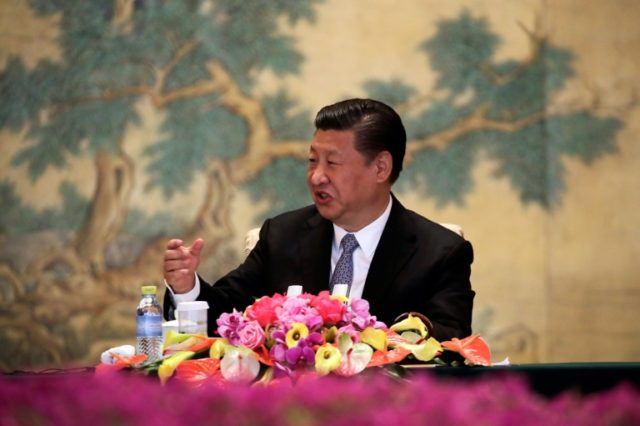Chinese President Xi Jinping gave a two-hour speech at a foreign policy conference in Beijing over the weekend touted by Chinese media as promoting world harmony through China’s “Belt and Road” infrastructure project.
As with every speech Xi gives, China’s state-run Xinhua news network quickly rounded up some “experts” to hail his remarks as one of the greatest orations in human history, even though Nikkei Asian Review reported attendees at the Conference on Work Relating to Foreign Affairs were “strictly forbidden to take notes” and “the full discussion, therefore, has not been released or leaked.”
Xinhua’s foreign policy experts did not need to see any forbidden notes to know that everything Xi said was amazing, and Chinese diplomacy is all about creating a wonderful shared future for all mankind:
Kirill Batygin, head of MandarinPro, a community of translators that focuses on the study of the Chinese language in Russia, said that the main ideas in Xi’s speech are actually the guiding principles for China’s diplomatic work.
The various highlights of Xi’s speech, such as his call to break new ground in major country diplomacy with Chinese characteristics and to actively participate in the reform of the global governance system based on such principles of fairness and justice, “convinced us that China is firmly committed to safeguarding the common interests of humankind,” said Batygin.
On diplomacy, China always honors its words with concrete actions, and the development of China-Russia ties is sufficient proof, the Russian expert added.
David Gosset, founder of the Europe-China Forum, said China has been pursuing the concept of “Datong,” or “the world of great harmony,” since ancient times, and the idea of building a community with a shared future for mankind is a reinterpretation of “Datong” in the 21st century.
With China’s continuous development, the idea, full of Chinese wisdom, will definitely have a profound influence on the world, he said.
Gerrishon Ikiara, an expert on international economics at the University of Nairobi and former permanent secretary in the Ministry of Transport and Communication of Kenya, praised China’s global role in security, counter-terrorism, investments and aid to developing countries.
Ikiara said he expects China to play an even bigger role on climate change, anti-terrorism, poverty reduction and global governance reform.
The Belt and Road Initiative (BRI) was prominently featured in Xi’s marathon two-hour speech, to the delight of analysts whose judgment certainly is not affected by the prospect of financial gains from China’s massive spending spree:
The BRI “combines not only one of the most transformational development initiatives, but also if done right, will bring a lot of positive changes in many of these countries, not just economically, but politically and in many other sectors,” said Zubaid Ahmad, a senior Wall Street banker who created an equity firm focusing on business opportunities arising from BRI projects.
Jim O’Neill, former Goldman Sachs chief economist who will become chair of Britain’s Royal Institute of International Affairs in July, said China is now “at the center” of all major global affairs.
He urged the British government to cooperate with China on such fields as the BRI, finance, health and clean energy.
Nikkei Asian Review took a more skeptical view of China’s foreign policy goals, anticipating that Xi will cynically exploit the seismic shift in the regional political landscape brought about by North Korean denuclearization. As NAR put it, China is not finished “skillfully using the tributary image” of Pyongyang’s subordinate relationship to Beijing to “gain advantages.”
A major move in Xi’s game is “cozying up to Japanese Prime Minister Shinzo Abe,” who was surprisingly invited to visit China before the end of the year, possibly for a trilateral summit with South Korean President Moon Jae-in:
Beijing also foresees a situation in the not-too-distant future where reducing the U.S. forces in Japan may come into play. Trump has repeatedly mentioned his displeasure with maintaining an expensive military presence abroad to protect America’s allies.
If such a scenario were to play out, it would not make sense for China to be on chilly terms with Japan. Any anti-China sentiment in Japan could lead Tokyo to build up its defense capabilities to counter China.
[…] Successive friendly meetings with Abe and South Korean President Moon Jae-in would enhance China’s favorable image and possibly drive a wedge in U.S-Japan or U.S.-South Korea ties, especially with trade tensions looming among the traditional allies.
“Once Abe is re-elected as party leader in September, the trilateral summit could take place any time after October,” a diplomatic source said.
From China’s perspective, it is imperative to improve its ties with Japan, at least to a neutral level, before Japan begins talks of normalizing diplomatic relations with North Korea, as is expected. Without at least one visit by Xi to Japan, China cannot claim influence over all of Asia.
NAR speculates Xi is hedging his bets on Abe until after the next Japanese election because there is a chance the weird abuse-of-power scandal swirling around Abe has seriously damaged his electoral fortunes. The latest polling from Japan suggests Abe has weathered that storm and his approval numbers are trending back up, essentially because he offered the public a heartfelt apology and they accepted it.
Just a few months ago, Xi was talking about how China will pursue a more aggressive foreign policy and abandon the alleged modesty of previous errors to “ride the mighty east wind of the new era.” His speech was laden with highly charged nationalist appeals to resist all efforts to divide Chinese territory, by which he meant resisting China’s territorial claims to disputed islands in the South China Sea and Taiwan. It should not be made easy for Chinese media to rebrand Xi as a humble seeker of world harmony whose every action is taken for the benefit of all mankind.

COMMENTS
Please let us know if you're having issues with commenting.